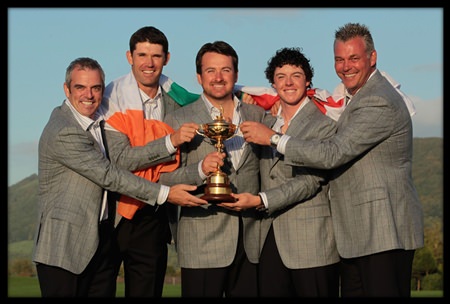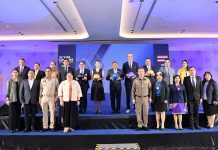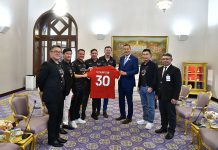A few years back, shortly after golf was readmitted to the Olympics, Rory McIlroy was being pressured into revealing which team he would represent. At one stage he appeared to be favouring the Team GB option when he stated he “felt more British than Irish.” The backlash this unguarded comment caused didn’t surprise many in Ireland, but its ferocity appeared to catch McIlroy by surprise. He even went on to say he may decline to play the Olympics so as to avoid all the fuss.
A couple of weeks back, he finally came to his senses and announced that he will represent Ireland at the Rio Games in 2016. Asked if he had been “torn” on the issue, McIlroy replied: “More worried about what other people would think, rather than me. But you’ve got to do what’s right for yourself and what you feel most comfortable with, and ultimately that was the decision that I made.”
 Irish golf’s famous five: Paul McGinley, Padraig Harrington, Graeme McDowell, Rory McIlroy and Darren Clarke.
Irish golf’s famous five: Paul McGinley, Padraig Harrington, Graeme McDowell, Rory McIlroy and Darren Clarke.
Why did this take so long?
Do you know the difference between the United Kingdom and Great Britain? The answer in one is Northern Ireland.
When it comes to the Olympics, however, things can get complicated. Recent major winners Graeme McDowell, Darren Clarke and Rory McIlroy are all citizens of the United Kingdom of Great Britain and Northern Ireland. Although they can choose which passport they travel under – Irish or UK – they probably all use the latter. What implications does this have if they elect to represent the Republic of Ireland at the next Olympics?
The team of Olympic athletes representing Great Britain and Northern Ireland (GB & NI) are more commonly known as “Team GB,” which may confuse some. Try telling modern pentathlete Mary Peters, who hails from Belfast, that her gold medal won at the 1972 games was a win for Great Britain.
Association football is also run separately with those representing Northern Ireland vying for FIFA World Cup qualification in competition with the team from the republic.
Most sports, however, tend to be organised on an all-Ireland basis where Northern Ireland and the Republic of Ireland often field the one team. In rugby union, for example, whether one plays for the northern province of Ulster, or any of the others – Connacht, Leinster, or Munster, if selected for national honours you will play for Ireland.
Golf also is administered by the one entity – the Golfing Union of Ireland – covering the same four provinces. This is the organisation that guided and funded McIlroy’s golf development throughout his amateur days. This is the organisation that McIlroy represented many times at various age-grade and top-line amateur events, including the Eisenhower Trophy in 2006 and the European Amateur Team Championship 2007 – which Ireland won.
When he turned professional, McIlroy would have come under the Professional Golfers’ Association (PGA). This hardly simplifies matters as it is the professional body representing the interests of pro golfers in both the United Kingdom and Republic of Ireland.
However, as a professional he represented Ireland in golf’s World Cup in 2009 and 2011. It was his involvement in these events that should have given McIlroy the best clue yet as to whom he should represent at the 2016 Olympics.
This was further reinforced by R&A Chief Executive Peter Dawson, last year, when he stated that if a player had appeared in the World Cup of Golf for Ireland than that is who he should play for. This seemed to clear up matters for most, but not, it appeared, for an often confused McIlroy. “There was a lot of people giving their opinion and what they think I should do,” he said. “But at the end of the day it’s a decision that I had to make for myself because it’s something that you have to live with. It’s taken me long enough to sort of get over the hurdle, but it’s definitely the right decision.”
Graeme McDowell, also from Northern Ireland, welcomed the news. “I think it’s great that he’s put it to bed at last,” he said. “I’m hoping to be there alongside him. There’s no doubt he’ll be there. It’s a very difficult decision, because if you want to get religious or political about it, declaring for one or the other, you’re going to upset someone theoretically.
“I was kind of glad that I had the opportunity to play the World Cup last year and put it to bed personally for me. There’s been absolutely no negative reaction and I don’t expect there to be any (to McIlroy). Anybody that wants to have a problem with it is looking at it too hard.”
For Buddha’s sake, he grew up playing amateur golf wearing a green jersey with a shamrock on his chest. Later, as a professional, he twice represented Ireland at the World Cup. Finally, listen to that accent – it has the dulcet tones of an Irish lilt – and wonder why it took so long!
Golfnutter




